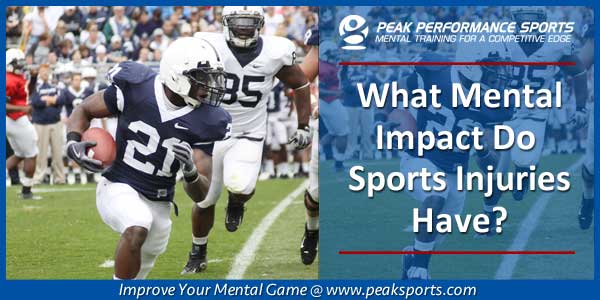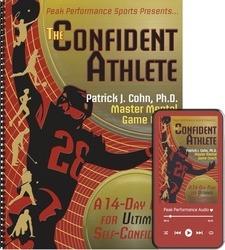
Psychology Of Sports Injuries
Injuries are part of all sports. In fact, research conducted by Safe Kids Worldwide estimated that 2.6 million athletes, ages 19 and under, are seen in emergency rooms for injuries related to sports and recreation each year.
These numbers don’t even include the injuries treated by family physicians or injuries that were less severe (pulled muscles, minor swelling, etc.) and not reported.
Of course, the physical challenges of an injury are difficult to manage, but the psychological impact may be a bigger obstacle for many athletes.
Think of an injury you had that affected your ability to play the sport you loved… Did you have any of these questions in your head?
- Will this injury affect my ability to achieve my goals?
- When will I be able to play again?
- Will I be able play again?
- If I get back to action, will I ever be the same athlete?
- How much confidence will I lose because of this?
Dealing with the loss of participation, arduous physical rehab, fear of re-injury, return to play and the attempt to compete at your previous level of performance are the difficult challenges all injured athletes face.
Another major issue for injured athletes is how to maintain confidence: How to find the confidence you had before the injury and how to have confidence in a body part that may be less than one hundred percent.
Jaylon Smith, former Notre Dame star linebacker, understands the heartbreak of injury. Smith was projected to be a top-five pick in the 2016 NFL draft before an injury at the Fiesta Bowl caused him to have knee reconstruction surgery.
With Smith unlikely to play at all in 2016, his draft stock plummeted until he was selected in the second round by the Dallas Cowboys.
The questions swirl about Smith’s future… Will he ever fully recover? Will he be forced into early retirement? If he does return to the game, will he be the same defensive force as he was in college?
Smith has kept his confidence high by focusing on the things he can control: his training, his rehab and his attitude.
SMITH: “I don’t have time to doubt myself. Whatever happens, it’s going to happen. But for me, a positive attitude and constantly putting work in to get better – that’s where I’m at, controlling what I can control.”
Smith has the knack for staying focused on a strong recovery, which keeps him positive and mentally strong.
SMITH: “I’m 20 years old. I’m young. The nerve will come back. It’s just a matter of time. No one can rush it. Our world is so like now, now, now. ‘Will Jaylon play in ’16?’ I may play. I may not play. It’s a possibility for everything.”
Be prepared to manage the mental game of injury and rehab as it’s not easy for any athlete.
If you can manage your emotions about injury, keep your confidence high, you can speed up the recovery process and become a mentally stronger athlete.
Mental Strategies for Coping with Injuries
If you want to cope with the mental impact of injury, you need to do a few things:
- Stay positive. Setbacks are inevitable but comebacks are a choice.
- Mentally and physically prepare yourself for the next step in the process. Do not discount the impact of mental factors in the recovery process.
- Focus on how you’ll recover and be stronger than before. Resist the urge to feel sorry for yourself or catastrophize about the future.
Related Sports Psychology Articles
- Staying Tough During Injuries with NFL Player Chris Vaughn
- How Athletes Deal with Stress
- Returning to Competition After Injury
*Subscribe to The Sports Psychology Podcast on iTunes
*Subscribe to The Sports Psychology Podcast on Spotify
Download a free sports psychology report to improve your mental game!
Learn more about our one-on-one mental game coaching.
The Confident Athlete

“The Confident Athlete” consists of 2 audio programs that include 14 days of confidence fueling exercises and a simple to follow workbook that guides you through the 14 days, helps you apply the strategies, and customizes the exercises to your personal needs.
Let me help you put a stop to the confidence leak. You can learn to have greater levels of confidence in competition than you do in practice by identifying the specific ways you undermine your own confidence and how to convert your practice confidence into COMPETITIVE CONFIDENCE.
“The Confident Athlete” is a ground-breaking system to teach you how to think like a champion and have ultimate self-confidence every time you step on the playing field, court, track, or course. The confident athletes was developed for any athlete – junior to professional –that wants to gain confidence. However, coaches and sports parents can learn how to teach others to perform with ultimate confidence. Use my program if you want to bust a slump or just wanting higher or more consistent levels of self-confidence.

I had no idea injuries were so common in sports, as i never had the issue, but I believe Warm Up is the best way to reduce injury chances.
By the way, Great post, very informative.